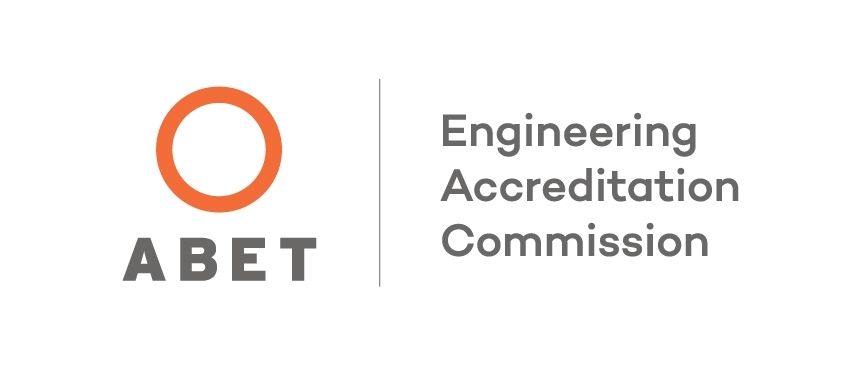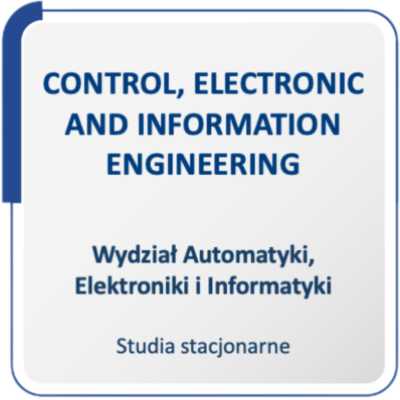- Opis
- Dodatkowe informacje
Opis
Control, electronic and information engineering
| Mode of study | Title obtained | Period of study | Language of instruction | Place of classes | Minimum number of credits | Admission limit | Points to guarantee admission |
|---|---|---|---|---|---|---|---|
| Full-time | Bachelor of Science (Inżynier) |
3,5 years / 7 semesters |
English | Gliwice | 45 out of 150 max. | 60 | 70 |
Faculty of Automatic Control, Electronics and Computer Science
Gliwice, 16 Akademicka St.
phone: 32 237 18 74
e-mail: air_waei_rekrutacja@polsl.pl
STUDIES RECEIVED PRESTIGIOUS ACCREDITATION DETAILED INFORMATION HERE
DETAILED INFORMATION HERE
During the first semesters, we will give you a thorough education in mathematics, physics, and computer and technical sciences: electrical engineering, control theory, electronics, metrology, computer programming, microprocessor systems, databases, computer networks, artificial intelligence, and computer vision systems. Attention will be paid to solving practical engineering problems and the integration of knowledge. After completing five semesters, you can choose a specialization, with subjects structured to expand your skills and expertise in control, electronics, or computer engineering.
The electronics, automatic control, and computer industries are currently the most dynamically developing. This creates a huge demand for highly educated specialists in these fields of engineering. The study program takes into account the current needs of the labor market.
After studies, you will be an engineer fully prepared to deal with technical problems arising in automatic control, IT, or electronics with knowledge and practical experience in the chosen area. If you are interested in electronics, automation, robotics, or computer science, this field of study is just for you.
By studying control, electronic and information engineering, you will gain knowledge, skills, and competencies in the:
- analog and digital electronic circuits, power systems, sensors,
- basics of digital and microprocessor technology,
- signal theory and methods of signal processing,
- issues of algorithms, their analysis, and optimization,
- creating software using different programming languages,
- the architecture of computer systems, computer networks,
- basics of operating systems,
- design and analysis of automation and robotics systems,
- cooperate with other people in interdisciplinary and international teamwork,
- think and act in an entrepreneurial way.
Regardless of the specialty, our students undergo the professional industrial practice. Close cooperation with companies from the region allows our students to complete internships in the best local and global enterprises. After completing the compulsory practice, students often continue their cooperation with the company on an internship or as regular employees.
Following graduation, you may enter the job market as a highly-demanded professional. You can continue your studies at the postgraduate level. Taking into account the increasing shortage of engineers in the European and world job markets, the degree awarded in any of the specializations guarantees you finding a rewarding, well-paid job. Actually, the majority of our students are recruited before graduation.
You can work as (among others):
- Designer or operator of control systems,
- Software Developer
- Computer engineer
- Network and system maintainer
- Database specialist
- Electronics hardware developer
- Measurement specialists
Qualification is based on the results of the written parts of the matura exam.
P = 0,5 × Wmp + k × Wadditional
where:
P – number of points in the qualification process,
Wmp – number of points (%) obtained in mathematics (basic level),
Wadditional – number of points (%) obtained in one additional subject (mathematics – advanced level, biology, chemistry, physics, computer science) or the result of vocational exams in a profession taught at the technician level,
k = 0.5 for the basic level,
k = 1 for the advanced level,
k = 0.7 for the result of vocational exams in a profession taught at the technician level.
Points are calculated using the subjects where the candidate scored the highest. If a subject wasn’t taken at a required level, it is counted as 0 points in the final calculation.
Full admission criteria, including those for applicants qualifying on a basis other than the matura exam (nowa matura) and the list of recognized technician-level professions, are available on a separate page.
Dodatkowe informacje
| Tytuł | inżynier |
|---|---|
| Stopien | Stopień I |
| Forma | Stacjonarne |
| Język | Angielski |
| Kierunek | Control, electronic and information engineering |
| Miasto | Gliwice |
| Profil | ogólnoakademicki |
| Rekrutacja | Pokaż |
| Wydział | Wydział Automatyki, Elektroniki i Informatyki |





